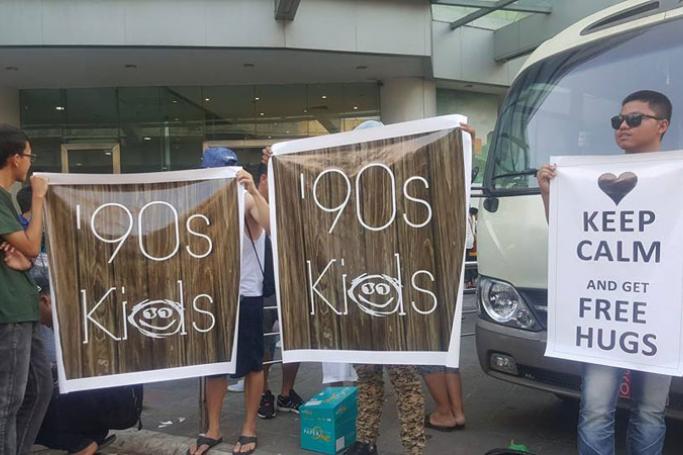A youth group called “90s' Kids Team” organised a “Free Hugs” campaign outside the Hledan Center in Yangon on May 8 the first of its kind in the country. “Free Hugs” is a social movement that involves individuals offering hugs to strangers in public places.
The intention of the Free Hugs campaign of the “90s' Kids Team” is not only to promote loving kindness and make other people feel better but also to raise public awareness for their charity event “Back to Memory Lane of the 90s” to be held at “Kandawgyi Tower Island” on May 29.
According to their Facebook page the “Back to Memory Lane of the 90s” will be like a time machine that will take you back to the 1990s. It brings back memorable songs, events, food, comic characters, cartoon characters and TV games that were popular then. Eighty percent of the money earned from selling tickets for the “90s' Kids Team” charity will be donated to monastic schools, where many young children are educated while twenty percent will be reserved for future charity events. The ticket price is Kyat 3,000 (about US$2.5) per ticket.
Yan Naing Oo, one of the organisers of the event told Mizzima, “We have three objectives. We would like to show young people can do more than just receive donations and we want to support education. We would also like to show that young people, by cooperating with older people, can do charity work.”
They pined for their childhood lives in the 1990s and they want to support children's education. Their idea, “Free Hugs” is fresh, at least in Myanmar. The group's innovative idea attracted huge public attention both positive and negative. On May 9, a day after their free hugs campaign many people showed their reaction to the free hugs campaign on Facebook.
Many Facebook posts warmly welcomed the Free Hugs charity-oriented project. On the other hand, some people felt were not too happy about it. They thought it was culturally inappropriate. Their status claimed that flesh-to-flesh contact between opposite sexes can cause sexual arousal.
Some people also criticised the Free Hugs campaign as it was directly copying Western culture. In response to that criticism, a supporter of the Free Hugs campaign said good things should be adopted. “Even our traditional costume —Paso [longyi] and Taikpon [Manchu Chinese jacket] — were taken from foreign countries to be our own.”
Some people on social media went beyond the boundaries of criticism and made personal attacks against the participants of the Free Hugs campaign.
Like proverbial moths to a flame, some hard-line nationalists used the “race and religion card.”They alleged that Myanmar Buddhist girls were hugged by Muslim men. Some people made unfounded allegations that Muslims sponsored the Free Hugs campaign to exploit Myanmar girls while some people alleged that white people sponsored the campaign. The accusers even forgot the fact that the money will go to Buddhist monastic schools for children's education.
The 90s’ Kids Team has denied such unfounded allegations. In response to those criticisms, Yan Naing Oo said, “We tolerate opposing views. But we cannot accept false rumours. And we feel sorry about their personal attacks.”
The Facebook page of the 90s' Kids Team also said, “Regarding various views, it is the nature of democracy, so everyone has the right to disagree. The important thing is that when we visit the “Back to Memory Lane”, we will give people only happy things. Thanks to those who support us. We will give the best response. We will respond with a smile. We will treat people with loving kindness.”
Using Facebook the group had invited any interested persons to volunteer and participate in the free hugs campaign. Many people were interested in it. To volunteer for the campaign, a girl came from Muse, which is more than 1100 km from Yangon.
More than 30 young people offered hugs in the campaign on May 8. Organizer Yan Naing Oo said, “We announced that tickets [for the event Back to Memory Lane] would be sold in the free hugs campaign, so about 200 people who came to buy the tickets exchanged hugs with us. Shoppers watched our activity. Some shoppers participated in the event and some did not.”
Generally speaking, we can say that the free hugs campaign was successful. It made participants happier. It made lonely people feel better. And best of all, it could raise the required public awareness for the event “Back to Memory Lane”, which will help children's education.
Great memories from childhood are treasures. Although many things including the lifestyles of the 90s' kids might have changed so much in the last two decades, the event will bring back great memories, and will make people who remember those days smile.
You are viewing the old site.
Please update your bookmark to https://eng.mizzima.com.
Mizzima Weekly Magazine Issue...
14 December 2023
Spring Revolution Daily News f...
13 December 2023
New UK Burma sanctions welcome...
13 December 2023
Spring Revolution Daily News f...
12 December 2023
Spring Revolution Daily News f...
11 December 2023
Spring Revolution Daily News f...
08 December 2023
Spring Revolution Daily News f...
07 December 2023
Diaspora journalists increasin...
07 December 2023












